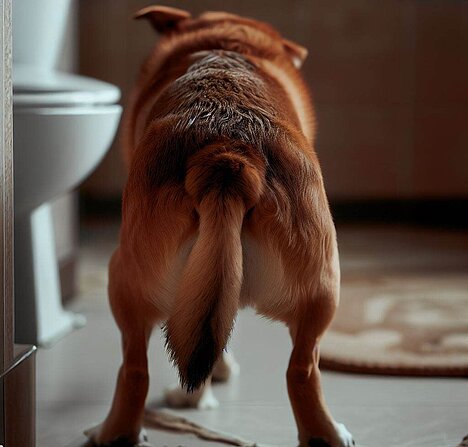Nausea

Nausea is an unpleasant feeling that everyone knows. But did you know that dogs can also suffer from nausea? Nausea in dogs can have various causes and manifest itself in different symptoms. In this article, you will learn how to recognize, prevent and treat nausea in your dog.
What is nausea and how does it manifest itself in dogs?
Nausea is a subjective sensation that is often accompanied by the need to vomit. Nausea can have emotional, physical and physiological factors. Humans can usually tell when they feel nauseous, but dogs can only show their feelings when they are already vomiting. That's why it's important to pay attention to the signs of nausea in your dog.
The most common symptoms of nausea in dogs include
- Excessive drooling
- Regular licking
- Constant rumination
- Lifting on a dry surface
- Vomiting or diarrhea
Nausea is not a symptom in itself, but may indicate a more serious problem. If your dog vomits occasionally, this is not usually a cause for concern. As long as your dog has a healthy appetite and is not unusually lethargic, you don't need to worry. However, if your dog has constant diarrhea or vomiting, you should go to the vet.
What are the causes of nausea in dogs?
Nausea in dogs can be caused by many different factors. As with humans, nausea in dogs is often caused by a change in diet. This can range from eating too much or too soon, to changing your dog's diet or feeding them something they shouldn't have eaten.
Motion sickness, for example when traveling in the car or chasing a tail, can also cause nausea in dogs.
Some of the more common causes of nausea in dogs include:
- Pregnancy
- Intestinal parasites such as worms and other parasites
- Separation anxiety
- Infections caused by viruses
- Inflammatory bowel disease (IBD)
Nausea is not breed specific, meaning that whether your dog is a Boston Terrier or a Newfoundland, you can expect your dog to be nauseous. However, older dogs are more prone to illness than younger puppies.
How can you prevent nausea in your dog?
It's hard to predict when your dog's nausea will occur or what will trigger it, but you can take steps to prevent your dog from getting sick.
Here are some tips for preventing nausea in dogs:
- Feed your dog high quality food and avoid sudden food changes.
- Don't give your dog foods that can be harmful to him, such as chocolate, onions or grapes.
- Don't let your dog eat too much or too quickly and give him a rest after eating.
- Avoid driving your dog in the car or offering him activities that can make him dizzy.
- Keep your dog away from garbage or other potentially toxic substances.
- Have your dog regularly examined and vaccinated by a vet.
- Deworm your dog regularly and protect him from fleas and ticks.
How can you help your dog with nausea?
If your dog is suffering from nausea, you can offer them some natural treatments and home remedies that can help them feel better.
Natural treatments and home remedies for nausea in dogs include:
- Giving your dog some water or ice cubes to hydrate him and settle his stomach.
- Give your dog some cooked rice or skinless, boneless chicken to ease his stomach.
- Give your dog some ginger, chamomile or peppermint to soothe his nausea. You can prepare these herbs as a tea or give them as capsules or drops.
- Give your dog some activated charcoal to bind toxins from his stomach. You can buy activated charcoal in powder form or as tablets.
- Give your dog some Bach flowers or CBD oil to reduce his anxiety or stress.
If your dog has vomited, you should not give him any food for a few hours to relieve his stomach. After that, you can give him small portions of easily digestible food. If your dog continues to vomit or show other symptoms, you should take him to the vet.
Nausea in dogs is a common problem that can have many causes. If you recognize the symptoms of nausea in your dog, you can help him with some natural treatments and home remedies. However, if the nausea persists or worsens, you should not hesitate to see your vet.
The authors assume that a veterinarian should be consulted if an animal is ill and that medication should only be taken after consultation with a doctor or pharmacist. Only an individual examination can lead to a diagnosis and treatment decision.
We help you find the nearest vet → This way